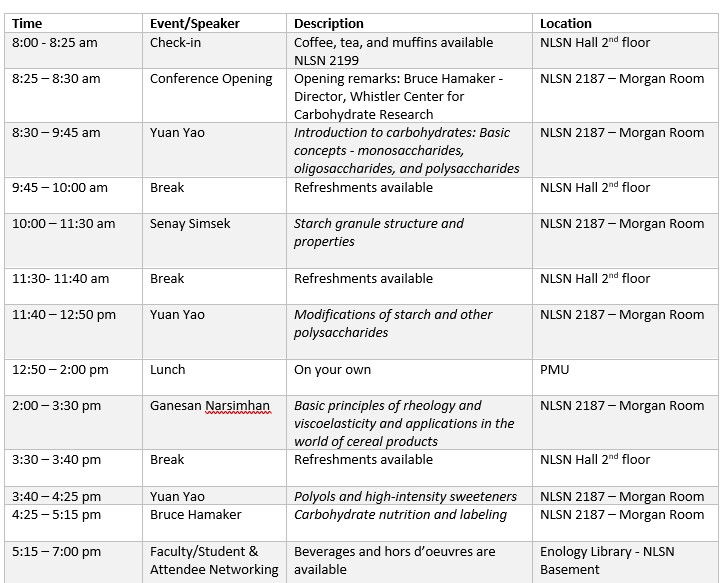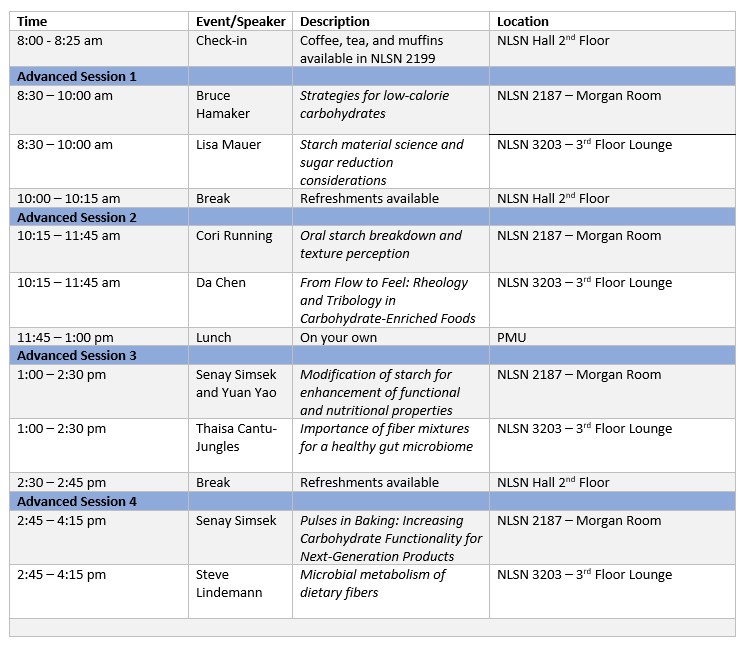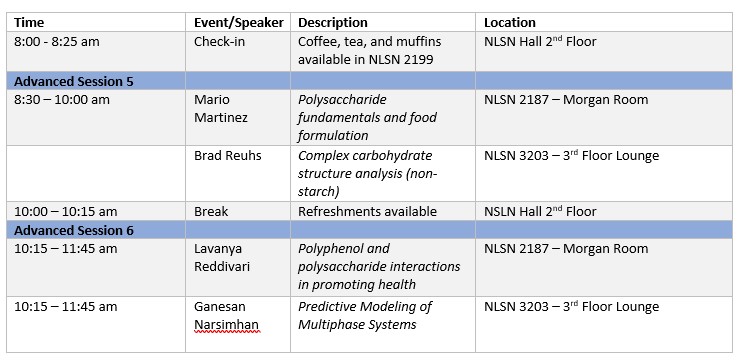Short Course - October 7-9, 2025
2025 Carbohydrate Short Course Program
Anyone can attend the Whistler Center for Carbohydrate Research 2025 Short Course for $2,000. This course is free for Whistler members. Get in touch with Melissa (mjones22@purdue.edu) for the discount code.
Short Course Only
We also offer an Education Package that includes the Short Course and 6 Webinars, the cost is $2500. 2025-2026 Webinar Flyer The webinars are free for Whistler members.
Education Package
SHORT COURSE PROGRAM
Tuesday, October 7, 2025

Wednesday, October 8, 2025 Thursday, October 9, 2025
Thursday, October 9, 2025
Advanced Course Summaries
Wednesday, October 8, 2025
8:30 - 10:00 am
Strategies for low-calorie carbohydrates – Bruce Hamaker
- There is a rising interest in low-calorie carbohydrates, both because of the negative consumer perception that carbohydrates are calorific and have a high glycemic value. By their nature, low-calorie carbohydrates are slowly digestible and have an indigestible component. This short course topic will explore various strategies to use in researching low-calorie carbohydrates, with emphasis on applications.
Starch material science and sugar reduction considerations - Lisa Mauer
- Starch material science explores the physicochemical, structural, and functional properties of starch as a versatile biopolymer. Composed primarily of amylose and amylopectin, starch exhibits complex hierarchical organization, from granule morphology to molecular architecture, which governs its behavior in thermal, mechanical, and aqueous environments. Interactions with sugars alter these behaviors and challenge sugar reduction strategies. This session touches on all of these topics.
10:15 – 11:45 am
Oral starch breakdown and texture perception – Cori Running
- As food is processed in the mouth, salivary enzymes begin the digestion process. This results in a dynamic change in oral texture. In this course, we will examine the oral biochemistry that contributes to this digestion, and then discuss how people experience textures differently as their individual biology contributes to the digestion process.
From Flow to Feel: Rheology and Tribology in Carbohydrate-Enriched Foods – Da Chen
- This short course provides a deep dive into the principles of rheology and tribology and their critical roles in shaping the texture, mouthfeel, and stability of carbohydrate-enriched foods. It will introduce how flow behavior, viscoelasticity, and lubrication affect product performance across a range of systems, including starch-thickened sauces, fiber-rich beverages, and hydrocolloid-based gels. Through real-world examples, the course equips food professionals with practical strategies to design and evaluate products that meet both processing and sensory expectations.
1:00 - 2:30 pm
Modification of starch enhancement of functional and nutritional properties - Senay Simsek and Yuan Yao
- Starch modification methods alter the functional and nutritional properties of native starches. This section will cover strategies for starch modification, preparations of resistant starch, and their impacts on starch functionality with regard to their application in food systems and digestibility characteristics.
Importance of fiber mixtures for a healthy gut microbiome - Thaisa Cantu-Jungles
- In this presentation, we will explore how strategic combinations of dietary fibers can shape the gut microbiome in more targeted and consistent ways than individual fibers alone. We will discuss the role of fiber synergy in enhancing microbial diversity, stimulating short-chain fatty acid production, and supporting beneficial taxa like butyrate producers—offering a new framework for designing next-generation prebiotics.
2:45 - 4:15 pm
Pulses in Baking: Increasing Carbohydrate Functionality for Next-Generation Products – Senay Simsek
- In this session, we will examine the functional and nutritional roles of pulse-derived carbohydrates and other macromolecules in baked goods. Pulses, including lentils, chickpeas, beans, and peas, are rich sources of complex carbohydrates, particularly resistant starches and soluble and insoluble dietary fibers, as well as bioactive oligosaccharides. This presentation will highlight how the carbohydrate composition of pulse flours influences water absorption, dough viscoelasticity, gas retention, and crumb structure. Emphasis will be placed on starch–protein interactions, enzymatic activity during baking, and their effects on glycemic response and textural attributes. Formulation strategies and processing innovations for optimal integration of pulses will also be discussed.
- In this session, we will discuss how microbes degrade and ferment fibers and how these fibers support whole gut communities. We will then connect these mechanisms to typical food fibers to understand how their effects arise.”
Thursday, October 9
8:30 - 10:00 am
Polysaccharide fundamentals and food formulation – Mario Martinez
- Structure-process-function relationships of various polysaccharides, including starches, arabinoxylans, and pectins, and their impact on texture, stability, and shelf-life in food products.
- Knowledge across nutrients (e.g., starch, cell walls and polyphenols) and hierarchical structures (e.g., food supramolecular structuring) upon processing will be in focus.
- Latest insights about polysaccharide-polyphenol interactions and their implications for metabolic health.
Complex carbohydrate structure analysis (non-starch) - Brad Reuhs
- In this course, you will learn about instrumentation and technology for structural analysis of complex polysaccharides.
10:15 - 11:45 am
Polyphenol and polysaccharide interactions in promoting health - Lavanya Reddivari
- Interactions between polyphenols and polysaccharides significantly affect the bioavailability and bioactivity of both compounds. This topic explores how polyphenols modulate the digestibility and fermentability of polysaccharides, while polysaccharides, in turn, influence the stability and biological activity of polyphenols. Additionally, we will examine the critical role of gut microbiota composition in mediating the health benefits arising from these interactions.
Predictive modelling of multiphase systems - G. Narsimhan
- Formation and stability of emulsions
- Formation, Syneresis and stability of foams
- Viscosity
- Characterization of flow behavior of Non-Newtonian fluids
- Rheology of dispersions
- Intrinsic viscosity of macromolecular solution - connection to conformation
- Gelation of proteins
- Baking of leavened food